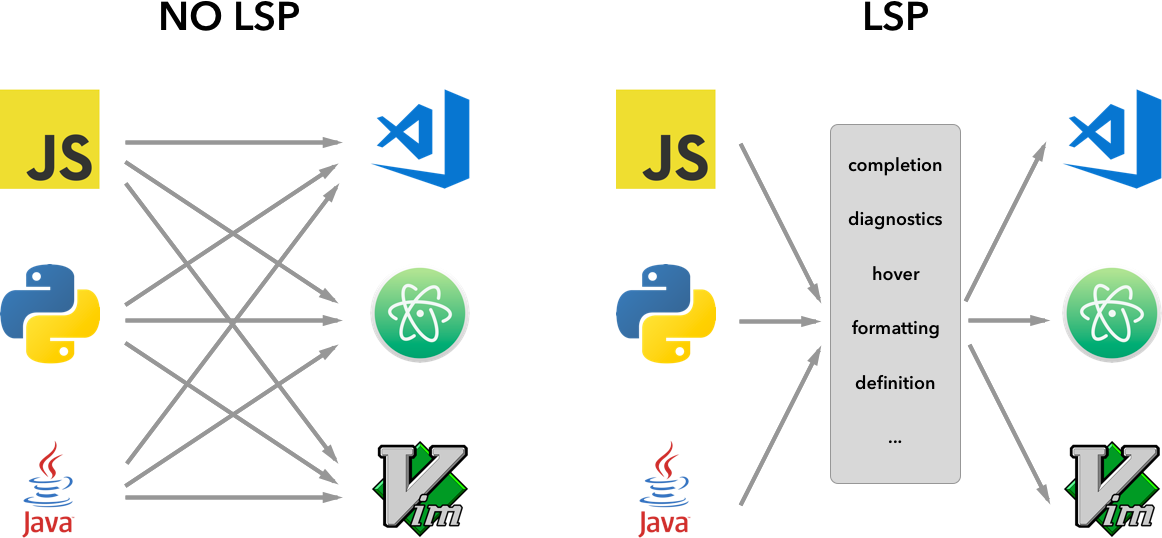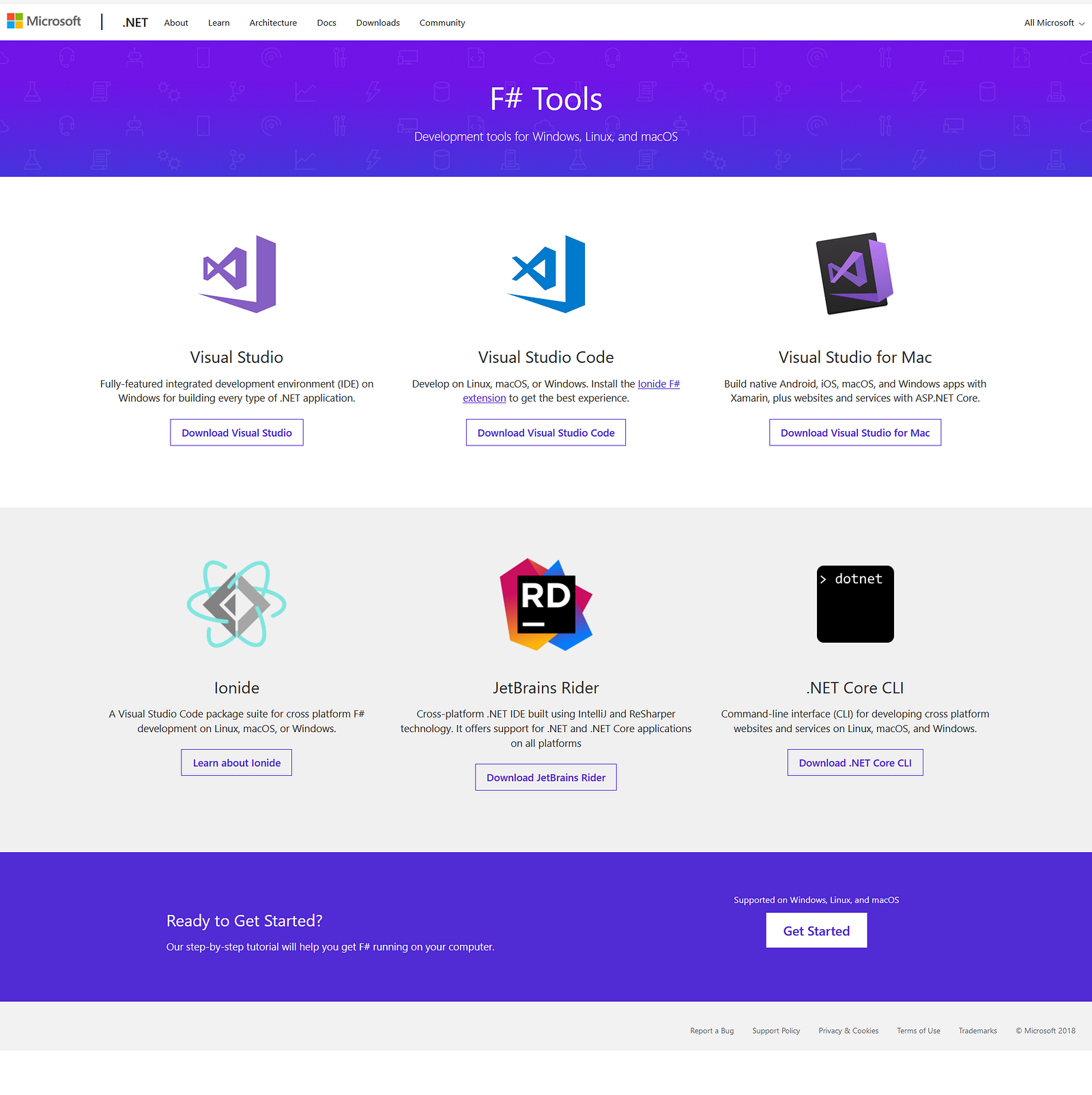
Future of F# cross-platform editor tooling
Future of F# cross-platform editor tooling
Currently we have this beautiful moment in the year when everyone writes, tweets, and instagrams about their achievements in past year, and plans for the next one. I’ve also done this before (often being week…or month late), however this year I decided to write about something else. So let’s talk about F# cross-platform, community driven editor tooling.
Language Server Protocol
Before diving into F# specific things, I need to mention project that has changed how editor tooling is built over the past two years - Language Server Protocol (LSP). LSP is specification of the communication between a client (editor) and a server that provides language tooling capabilities such as autocomplete, tooltips, etc. It reduces the* m-times-n* problem to the m-plus-n problem —similar to how Virtual Machines solve the same problem for deploying code to many platforms (great example here is Z-machine).

For example, instead of creating a Python VSCode plugin, a Python vim plugin, a Python Atom plugin, and Python plugins for any other potential clients, it allows developers to focus on single implementation of language server, this will be automatically supported by all clients that implement LSP.
Of course idea of language server is not new — it’s been fairly common way to create language tooling. In fact, the F# language already has a language service called the F# Compiler Service. It’s an F# API into the internals of the F# compiler, which does all of the heavy lifting in determining things that are useful for editor tooling. However, it is ultimately just an F# (i.e., .NET) API and cannot be consumed in every environment without an additional interface. An additional layer that can interface between the F# Compiler Service and any editor (i.e., not just Visual Studio) is needed to allow for F# tooling to be used everywhere.
FsAutoComplete
As I’ve mentioned — the idea of a language server is not new. And F# has been having one for years. Initially created in 2011 (as far as I know, that was way before I’ve joined F# community), FsAutoComplete (FSAC) has been used by all editors that aren’t Visual Studio, such as Atom, Emacs, Vim, and VSCode. The project provides a high level API over the F# Compiler Services, and communication layer (standard I/O, and HTTP web server) that enables using it from non -.Net platforms. It’s been long standing project, with many past iterations — in fact, prior to the F# Compiler Service API being made available, it used reflection over the F# compiler to access internal APIs! It has had many great maintainers and contributors over the years (I especially need to mention here Dave Thomas, Robin Neatherway, Tomas Petricek, and Enrico Sada) and it has been the magic that powers Ionide since day-0.
Current status
When I started Ionide 4 years ago, FSAC was in pretty good shape, providing many crucial APIs and one communication layer (stdio). Over the years, I started to contribute more and more to the project, and with help of all awesome people involved, new contributors and community support we’ve managed to transform FSAC into one of the best language servers I know (especially considering it is not a commercial language service, such as those authored by Microsoft or JetBrains), and I feel that it has been one of the most important tools created by the .NET OSS community.

Also, what is important personally for me is the level of innovation that we’ve managed to achieve in FSAC and Ionide. Additional diagnostics such as unused opens or unused bindings, integration with a third party linter, features powering Ionide’s CodeLenses, background caching that enables very fast use of any feature that requires symbols (such as Find References, CodeLens showing number of references, etc.), and even custom F# Analyzers. These are not the features that you typically see in the editor tooling created by independent vendors, nor especially in editor tooling for FP languages (yes, some of those features have been present in powerful IDEs for particular languages — CodeLenses for C# in VS, or famous background caches in JetBrains IDEs — but never for FP languages, and never provided by community driven tools)
Bright Future?
So the title of the post promised talking about the future… but the future is now. Today, I’d like to show you the thing I’ve been working on over the Xmas break for last 2 weeks — the LSP communication layer for the FSAC.
Huge thanks goes to Julien Roncaglia for his initial work on LSP + FSAC proof of concept few months ago, and his F# LSP server abstraction implementation that has been used as a base for my current work.
Being active maintainer for editor tooling for 2 different languages, a developer that created plugins for multiple editors, and someone that is generally interested in editor tooling, it has become obvious for me that LSP has won (at least in the niche of cross platform tooling provided by community/independent vendors). There are more and more client implementations (including really interesting online IDEs like GitPod), more and more server implementations (which means there are more and more investments into clients) and the protocol itself is becoming more powerful and feature-ful. I strongly believe that it is the future of the F# cross platform tooling. From the F# point of view there is couple of important advantages:
- It moves lot of code from Ionide code base to the FSAC code base — it means that other editors than VSCode can use some of the improvements that has been “hacked” in Ionide itself
- It makes the contribution process easier — Ionide is a VSCode plugin written in F# compiled to JS with Fable using FSAC (totally separate code base). This makes the process of contribution a bit awkward — if you want to contribute you need to know which code base to work in, if it’s Ionide you need to have the Fable toolchain set up. The idea behind using F# for Ionide was lowering the bar for contributors (“people interested in making F# tooling better are F# developers so the code should be F#”). As lot of Ionide code is moved to the FSAC, it makes contributions even easier by moving a lot of code to a normal F#/.NET Core project
- It’s good news for anyone wanting to use Atom or Vim or Emacs (or maybe ST3?) — some of those plugins have not been maintained very actively (or have been deprecated like Ionide-Atom), but moving to LSP will mean that getting all new fancy features should be way easier or “free”.
- I’ll soon start to work on Ionide 4.0 release that will be based on LSP. Lot of Ionide code will be removed, since Ionide provides more functionalities than just language features — things like solution explorer, creating new projects, right click -> debug, and many features focused on developer experience are implementations specific to VSCode (and that will probably never change).As FSAC will take over lot of responsibilities, I hope to focus more on the UX in Ionide itself, which is also a very interesting problem on its own.
As a side note — we are looking for new maintainers for FSAC. We would love your help!
Grim Future?

Of course, every real life story have also bad parts. And there are couple of the dark clouds on the horizon. First of all, some of the problems with Ionide/FSAC won’t go away with moving to LSP— they are connected to the complexity of build and require more knowledge and time than I have (if someone from MSFT is reading it — I would love to get, for late Xmas gift, open source, cross platform language server for the .Net project system). But that’s just a technical problem. The bigger one is that nothing has changed for last year and I can repeat my words from last years’ post. While I believe that F# ecosystem is in its best shape ever, it’s still building a castle on the sand — not enough contributors, depending on same handful of people that overproduce, no commercial support for OSS projects, no companies interested in investing into F# OSS ecosystem. Ionide and FSAC are both in unsustainable state — crucial projects for F# community, with thousands of users, that are used by a huge part of the community every day — they get no commercial support and there are not enough contributors to make up for this.
So… 2019?

So, how will 2019 will look like? Only time will tell. But in general I believe that there are more bright sides to the story than dark clouds. F# ecosystem is in fairly OK place — tooling is really OK, .NET Core adoption is rising which is a good sign, there are more and more interesting projects, community is active, and projects like the SAFE stack are becoming mature and are getting decent adoption.
However, as a community we still haven’t solved the problem of OSS maintainability. One one hand, it’s nothing unusual — most communities struggle with those problems. On the other hand, it’s obvious that F# commercial adoption is very often driven by the few people building awesome OSS things, and maybe we should help them somehow?
Anyway, I hope you will build great things with F# in 2019!
